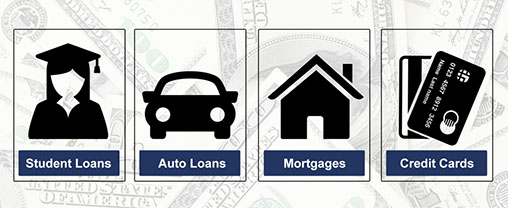The Best Way to Pay Off Five Different Types of Loans
At some point or another, everyone takes out a loan. In fact, most of us will take out three very common types: student loans, auto loans and home loans. The other very familiar form of debt comes courtesy of either credit cards and bad credit loans. While borrowing money this way doesn’t need to be a bad thing, many would like to pay off the balance ASAP. The problem is treating these five forms of debt the same exact way when trying to do so.
(Free to use photo if a link back to us is provided)
Student Loans
They seem like such good ideas at the time, but if you’re like most college graduates, your student loans are a bittersweet reminder that, while you may have had fun during these formative years, you’re now paying for it every month, usually for well over a decade.
Student loans are the only form of debt you can’t get rid of, even if you declare bankruptcy. Therefore, it would be a good idea to make paying off the balance a priority.
If it’s not too late, don’t take the deferment period. Instead, start repaying it immediately. Secondly, don’t make only the minimum payments. Anything you can pay above the minimum required will go directly to the principal. Look at your budget and see how much you could afford to add to your monthly payment to move up the end date on that loan.
Don’t forget to periodically check your interest rate. If you took out federal student loans, you probably have a competitive rate. But if you have private loans, particularly those with a variable interest rate, you may want to consider refinancing. This can also help if you’re having trouble repaying your loans and want to lower your monthly payments by extending the repayment period.
Auto Loans
The conventional advice on auto loans is to round up your monthly payment to the nearest hundred so you can be free and clear a lot sooner. That’s not necessarily bad advice, but check first to make sure you’re not going to be penalized for paying off your loan earlier. This is a real penalty that many well-intentioned people have found out about the hard way. Once you’ve incurred it, there’s nothing you can do.
Also, if you can’t afford rounding up like that on each payment, then try to make one extra payment each year. Another alternative is to find a low-interest credit card or personal loan, especially if you’re close to paying off your full balance. Some credit cards even let you consolidate auto loan debt with a low or 0% introductory offer. Just be sure you can pay it all off before your rate jumps after the promotional period ends.
Mortgages
This should represent the largest loan you ever take out. For this reason, it’s also probably going to be the hardest to ever pay off. Again, try making an extra payment each year and you’ll be in much better shape. To make this a bit easier, instead of doing a lump sum, just take the cost of a 13th payment and spread it out over 12 months. If your credit score has improved since you took out your mortgage, see if you could save money by refinancing. Also, remember that if you put down less than a 20% down payment, you’re probably paying private mortgage insurance each month. It may be worth checking home values in your area to see if you’ve hit 20% equity and could drop off that extra fee each month.
Credit Cards
Although mortgages may be the biggest and toughest form of debt to pay off, credit cards probably represent the most frustrating (and expensive). Once again, to speed up your path to freedom, don’t just make minimum payments.
If you have more than one card, start with the highest debt first. Then, once it’s paid off, use the amount you were paying on that and move to the next smallest. This strategy will give you much needed momentum toward your goals. Debt consolidation loans with lower interest rates are also an alternative you can consider to help squash your credit card debt even more quickly.
Bad Credit Loans
Getting a bad credit loan can help you out during a financial emergency, even if you are paying a high interest rate. But just because you have a long time left to pay on that loan doesn’t mean you’re stuck with that high APR. Once some time has passed and your credit score has improved, try applying for a cheaper financing product. This could be either a debt consolidation loan or credit card. The key is to make sure that you’ll save money on both interest and any other fees associated with your new financing. Pair that with extra payments and you’ll knock out that bad credit loan debt in no time.
Debt isn’t necessarily a bad thing, but it can also spiral out of control in no time. Apply the four strategies we just covered to their respective loan types and you’ll soon have control over these important finances like never before.

